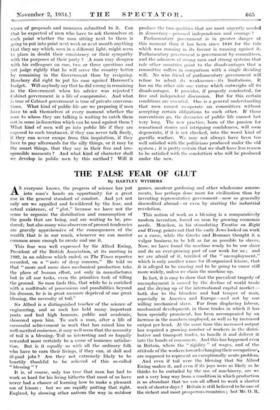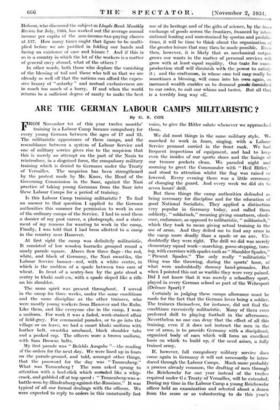THE FALSE FEAR OF GLUT
By HARTLEY WITHERS
AS everyone knows, the progress of science has put into man's hands an opportunity for a great rise in the general standard of comfort. And yet not only are we appalled and bewildered by the fear, and actual existence, of " glut," because we have not the sense to organize the distribution and consumption of the goods that are being, and are waiting to be, pro- duced; but also many wise observers of present tendencies are gravely apprehensive of the consequences of the wealth that is in our reach, whenever we can muster common sense enough to create and use it.
This fear was well expressed by Sir Alfred Ewing, President of the British Association, at its meeting in 1932, in an address which ended, as The Times reporter recorded, on a " note of deep concern." He told us that " more and more does mechanical production take the place of human effort, not only in manufactures but in all our tasks, even the primitive task of tilling the ground. So man finds this, that while he is enriched with a multitude of possessions and possibilities beyond his dreams, he is in great measure deprived of one great blessing, the necessity of toil."
Sir Alfred is a distinguished teacher of the science of engineering, and as such has held many important posts and had high honours, public and academic, showered upon him. To such a man, after a life of successful achievement in work that has raised him to well-merited-eminence, it may well seem that the necessity of toil is a blessing: Toil so interesting and so happily rewarded must certainly be a cause of immense satisfac- tion. But is it equally so with all the ordinary folk who have to earn their livings, if they can, at dull and ill-paid jobs ? Are they not extremely likely to be heartily thankful to be relieved of this so-called " blessing " ?
It is, of course, only too true that man has had to work so hard for his living hitherto that most of us have never had a chance of learning how to make a pleasant use of leisure ; but we are rapidly putting that right. England, by showing other nations the way in outdoor games, amateur gardening and other wholesome amuse- ments, has perhaps done more for civilization than by inventing representative government—now so generally discredited abroad—or even by starting the industrial revolution.
This notion of work as a blessing is a comparatively modern invention, forced on man by growing economic needs. Mencken, in his stimulating Treatise on Right and Wrong, points out that the early Jews looked on work as a curse, while the Greeks and Romans thought it a vulgar business, to be left as far as possible to slaves. Now, we have found the machine ready to be our slave and do an ever-growing part of our work for us ; and we are afraid of it, terrified of the " unemployment," which is only another name for ill-organized leisure, that it is alleged to be causing and to be going to cause still more widely, unless we chain the machine up.
In fact, it is easy to show that the prevalent tragedy of unemployment is caused by the decline of world trade and the drying up of the international capital market— both due to the blunders and bad temper of man, especially in America and Europe—and not by our willing mechanical slave. Far from displacing labour, mechanical development, in those trades in which it has been specially prominent, has been accompanied by an increase in the numbers employed, as well as by increased output per head. At the same time this increased output has required a growing number of workers in the distri- butive and transport trades, to handle it and deliver it into the hands of consumers. And this has happened even in Britain, where the " rigidity " of wages, and of the attitude of the workers towards changing their occupation.. are supposed to represent an exceptionally acute problem.
And even if toil were the blessing that Sir Alfred , Ewing makes it, and even if its joys were as likely as he thinks to be curtailed by the use of machinery, are we not a very long way from a condition in which production is so abundant that-we can all afford to work a shorter week of shorter days ? Britain is still believed to be one of the richest and most prosperous countries ; but Mr. 0. R. Hobson, who discussed the subject in Lloyds Bank Monthly Review for July, 1934,, has worked out the average annual income per capita of the non-income-tax-paying classes at £37. How many times ought that figure to be multi- plied before we are justified in folding our hands and facing an existence of ease and leisure ? And if this is so in a country in which the lot of the workers is a matter of general envy abroad, what of the others ?
In other words, both those who deplore the vanishing of the blessing of toil and those who tell us that we are already so well off that the nations can afford the expen- sive luxury of " autarky " and mutual exclusiveness are in much too much of a hurry. If and when the world returns to a sufficient degree of sanity to make the best use of its heritage and of the gifts of science, by the- freer exchange of goods across the frontiers, financed by inter- national lending and unrestrained by quotas, and prohibi- tions, it will be time to think- about the organization of the greater leisure that may then be made possible. Even then, however, it is likely that as mechanical output: grows our wants in the matter of personal services will grow with at least equal rapidity. Our Amite for mass- production stuff will "diminish with the power to. satisfy it ; and the -craftsman, in whose case toil may: really be sometimes a blessing, will come into his GW11. agftin, as increased wealth .enables us to demand gooditsfurnished to our order, to suit our whims and tastes. But all that is a terribly long way of;.















































 Previous page
Previous page